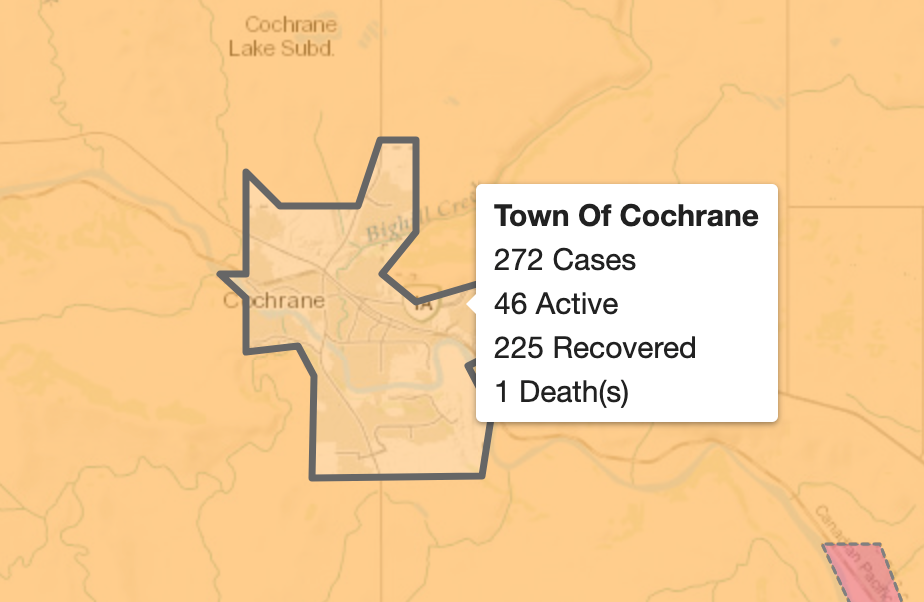ALBERTA— Alberta Premier Jason Kenney announced Thursday (Jan. 7), the province's current health measures will remain in place until at least Jan. 21.
He was also announced students will be returning to their classroom as planned on Monday (Jan. 11).
As of Wednesday (Jan. 6), there were a reported 46 active cases of COVID-19 in Cochrane. To date the town has identified 272 cases of the virus— 225 people have recovered and one person has died.
In Alberta 968 new active cases have been identified in the last 24-hours after the completion of 14,830 tests.
There are a reported 871 Albertans hospitalized due to COVID-19, including 139 in intensive care units.
An additional 24 people have died. To date, 1,217 COVID-related deaths have been reported in Alberta.
The current provincial positivity rate sits at 6.4 per cent.
Alberta’s Chief Medical Officer of Health Dr. Deena Hinshaw said it is essential to keep current health measures in place. She added it will be critical to limit in-person interactions as much as possible to limit the spread of COVID-19 in the province.
“Our health care system is still under extreme pressure and this is impacting our ability to care for all the health needs of Albertans," she said.
Public Health officials will closely monitor COVID-19 spread over the coming weeks to see if it is safe to begin relaxing health measures.
“The progress we make over the coming weeks will help determine how the coming months look in our province,” Hinshaw said. “We can reduce the spread in our province by working together and protecting each other.”
Kenney acknowledged the announcement of the extended timeline of stringent COVID-19 health measures will be frustrating to hear for angry Albertans given the "terrible judgment" multiple United Conservative caucus members made to travel over the holidays.
The premier offered an apology for the controversy and said he should have laid out clearer rules for his team.
“It was insulting for government leaders to holiday outside of the country,” Kenney said. “I know people are deeply frustrated, and they should be frustrated, and they are right to be frustrated, but that frustration cannot stop hard decisions that must be made to protect public health.”
Kenney said the United Conservative Party is trying to show there are consequences for this behaviour and are continuing to rebuild a culture of “discipline and humility.” Policies have been updated to ensure elected officials do not travel abroad unless for essential business.
He added there is the expectation those holding significant positions of public trust have a need for a higher standard of exception. Kenney defined those in positions of public trust as people who are elected officials and senior political staff in key decision-making roles.
“This could impair the moral authority of government to ask Albertans to continue to make these deep sacrifices,” Kenney said. “The events of last week were deeply, deeply unfortunate. They were wrong— The reality is we that have to continue to keep our eye on the ball which is protecting people’s lives and livelihoods.”
In regards to the return to school, the plan was carefully chosen based on cases dropping in all school-related age groups, Kenney said, along with the importance of being able to learn in person. The plan for schools will adapt as needed based on the pandemic.
“Schools play a key role in supporting students learning as well as their emotional health, mental health and overall well-being,” Kenney said.
At the beginning of the school year families had the option to choose if students would go on-line or in the classroom. About 20 per cent of families chose to move online.
For those that chose in-person learning, between September and the winter break only 0.4 per cent of students and school staff tested positive for COVID-19.
Hinshaw said only six per cent of these COVID-19 cases were acquired at schools based on the data available. She added, elementary students were in school in December and saw case numbers drop after extracurricular activities and social gatherings were limited.
“There are no risk-free options with COVID— But as I have outlined our data indicates the current school model in place is largely effective at limiting in-school transmission,” Hinshaw said. “The key to keeping our schools, workplaces, continuing care facilities and the rest of society's health is limiting the transmission in our communities.”




